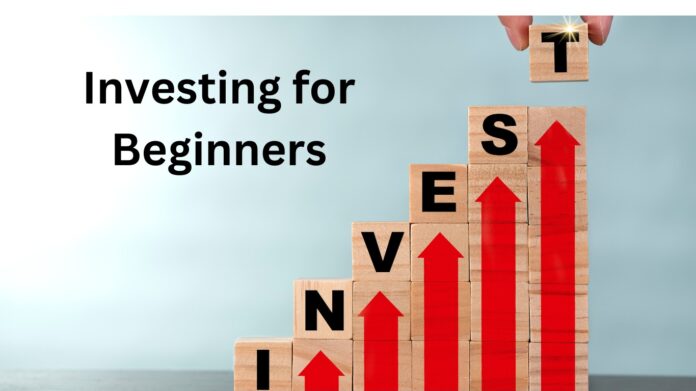Investing can seem frightening, especially if you’re just starting out. The world of stocks, bonds, mutual funds, and other investment vehicles might feel like a complex maze. But fear not! With the right knowledge and mindset, investing can become not only manageable but also an exciting path to financial empowerment. Let’s embark on this journey together, breaking down the essentials of investing, and equipping you with the tools to make informed decisions.

Understanding Investing : Investing for Beginners
At its core, investing is the act of allocating money into financial instruments or assets with the expectation of generating a profit or income. This could include buying shares of a company, investing in a real estate property, or putting money into a mutual fund. The ultimate goal of investing is to grow your wealth over time.
Why Invest? Investing for Beginners.
Wealth Creation: Investing allows your money to grow. Instead of sitting idle in a savings account with minimal interest, invested money can potentially earn significant returns.
Beating Inflation: Inflation erodes the purchasing power of money. Investing in assets that generate returns above the rate of inflation helps maintain and increase your wealth.
Achieving Financial Goals: Whether it’s buying a home, funding your children’s education, or retiring comfortably, investing helps you achieve these long-term financial goals.
Getting Started: What to Keep in Mind: Investing for Beginners
Step 1. Educate Yourself
Take the time to learn about different investment options, how markets work, and basic financial principles. There are numerous resources available, from books and online courses to financial news websites and podcasts.
Step 2. Set Clear Goals
Understand why you’re investing. Are you saving for retirement, a down payment on a house, or a future vacation? Clear goals help determine your investment strategy and the level of risk you’re willing to take.
Step 3. Start Small
Even small, regular investments can grow significantly over time thanks to the power of compounding.
Step 4. Diversify Your Investments
Diversification means spreading your investments across different asset classes (stocks, bonds, real estate, etc.) .If one investment performs poorly, others may perform well, balancing out potential losses.
Step 5. Understand Your Risk Tolerance
Risk tolerance is your ability and willingness to lose some or all of your investment in exchange for higher potential returns. Assessing your risk tolerance is crucial because it helps you choose investments that align with your comfort level. Younger investors might opt for higher-risk investments because they have more time to recover from losses, while older investors might prefer more stable, lower-risk options.
Step 6. Create an Emergency Fund
Before you start investing, ensure you have an emergency fund in place. This fund should cover three to six months’ worth of living expenses and be kept in a readily accessible account. An emergency fund provides a financial cushion and prevents you from having to sell investments at an inopportune time to cover unexpected expenses.
Steps to Avoid Losses While Investing : Investing for Beginners
1. Do Your Homework
Research thoroughly before making any investment. Understand the fundamentals of the companies or assets you are investing in. Don’t rely solely on tips or advice from others without doing your due diligence.
2. Avoid Emotional Investing
Emotions can be your worst enemy in investing. Fear and greed can drive irrational decisions. Develop a disciplined approach and stick to your investment plan, regardless of market fluctuations.
3. Be Wary of Get-Rich-Quick Schemes
If something sounds too good to be true, it probably is. Be cautious of investments that promise high returns with little risk. These are often scams or highly speculative investments.
4. Regularly Review and Rebalance Your Portfolio
Markets change, and so do your financial goals and risk tolerance. Regularly review your portfolio to ensure it still aligns with your objectives. Rebalancing your portfolio periodically helps maintain your desired asset allocation and manage risk.
The Benefits of Investing as a Beginner :Investing for Beginners
1. Time is on Your Side
One of the biggest advantages of starting to invest early is time. Compounding is when your investment earnings generate their own earnings, creating a snowball effect over time.
2. Learning and Growth
Starting early allows you to learn and gain experience gradually. You’ll have time to understand market cycles, develop your investment strategy, and learn from your mistakes without the pressure of imminent financial goals.
3. Building Financial Discipline
Investing requires discipline and regular contributions, fostering good financial habits. This discipline can spill over into other areas of your financial life, such as saving and budgeting.
Preparing Yourself for Investing : Investing for Beginners
1. Set a Budget
Determine how much money you can comfortably invest each month without compromising your day-to-day expenses or financial security. A budget helps you allocate funds systematically towards your investments.
2. Automate Your Investments
Consider setting up automatic transfers from your bank account to your investment accounts. Automation ensures consistency and removes the temptation to skip contributions.
3. Seek Professional Advice
If you’re unsure where to start or feel overwhelmed, consider seeking advice from a financial advisor. A professional can help tailor an investment plan to your specific needs and goals.
4. Stay Informed
Staying informed helps you make better investment decisions and adapt to changing market conditions.
5. Join Investment Communities
Engaging with others who are also learning to invest can provide support, share insights, and offer different perspectives. Online forums, investment clubs, and social media groups can be valuable resources.
Investing for Beginners
Investing as a beginner might seem intimidating, but with the right approach and mindset, it can become a rewarding journey towards financial independence. Remember, the key to successful investing is education, patience, and discipline. Start small, diversify, and avoid letting emotions drive your decisions. By taking these steps, you’ll not only grow your wealth but also build a strong foundation for your financial future. Happy investing!
What is investing, and why should I start?
Investing means putting your money into financial instruments or assets like stocks, bonds, or real estate to grow your wealth. It’s a powerful step toward financial independence and achieving your dreams.
What is risk tolerance, and how do I determine mine?
Risk tolerance is your comfort level with losing some or all of your investment for potential higher returns. It depends on your financial goals, timeline, and how you handle financial losses.
How can I minimize the risks of investing?
Minimize risks by diversifying your investments, educating yourself, setting clear goals, reviewing your portfolio regularly, and avoiding emotional investing.
What’s the difference between stocks, bonds, and mutual funds?
Stocks are ownership in a company, bonds are loans to a company or government with regular interest, and mutual funds pool money from many investors to buy a diversified portfolio managed by professionals.
How often should I review my investments?
Review your investments at least once a year or whenever your financial situation or goals change significantly to ensure they align with your objectives.
Should I seek professional help for investing?
If you’re feeling overwhelmed, a financial advisor can provide personalized advice, create a tailored investment plan, and offer support throughout your journey.
What are the most common mistakes beginners make, and how can I avoid them?
Common mistakes include not diversifying, chasing high returns, emotional investing, and lack of research. Stay informed, patient, and disciplined to avoid these pitfalls.
How can I stay motivated and confident in my investing journey?
Celebrate small wins, focus on long-term goals, engage with investment communities, and continue learning. Remember, each step you take today builds a foundation for a prosperous future. Happy investing!




